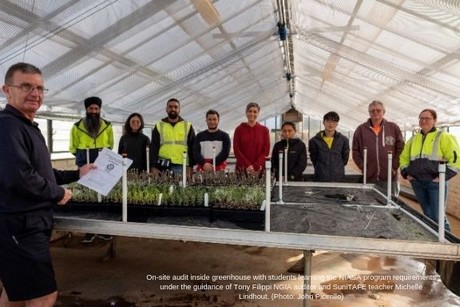It is an acknowledged fact that all nursery production businesses place a high premium on acquiring and/or retaining staff with the skills of professional management practices. Across industry however, there are many businesses reporting a lack of available labour both skilled and unskilled.
by Tony Filippi, NGIA Biosecurity Certification Officer
Given these shortages, it was reassuring to see that the Sunraysia Institute of TAFE (SuniTAFE) situated in Mildura Victoria has commenced implementing industry accredited programs taking a novel approach to encouraging participation in training.
Earlier in January this year, SuniTAFE commenced a refurbishment of their farm nursery greenhouse which included innovative smart technology funded by the Regional and Specialist Training Fund (RSTF) programs. This program is a funding stream initiative designed to meet targeted regional industry and specific community training needs across Victoria.
To cater for this, one such prerequisite for innovative technology identified by Michelle Lindhout (Teacher - Primary Industries) at SuniTAFE, was to ensure the nursery industry accreditation programs of Best Management Practices (Nursery Industry Accreditation Scheme Australia, NIASA), Environmental Management (EcoHort) and the industry Plant Health Assurance System (BioSecure HACCP) were part of this program. These programs have been in operation with the industry for a number of years however few registered training organizations are accredited or recognise what these programs can deliver.

Following are some questions posed to Michelle as to what motivated SuniTAFE to adopt these programs:
Why are you implementing the accreditation programs, and what outcomes do you expect for the students and industry?
"To demonstrate best practice and provide industry awareness to students & to provide a facility for local nurseries to use as a physical resource that demonstrates how they too can implement the requirements of the nursery accreditation schemes. In turn, this will strengthen the local nursery sector and knowledge can be carried to any other regions that students or businesses may move to in the future as it is a national program."
How will the accredited programs cater for this?
"The nursery site upgrade and industry accreditation programs are the start for SuniTAFE’s newest venture which is to redevelop their 30ha farm to a training facility showcasing a range of horticultural crops and focusing on ‘Smart Technologies’. The SuniTAFE Farm will provide innovation, industry relevance, and produce the next generation of the horticultural workforce trained with the skills to lead us into the future."
How will you use the nursery accredited programs with the curriculum?
"The unit selection in Certificate III Production Nursery is very well put together and provides broad opportunity to incorporate the accreditation standards including hygiene and biosecurity. By adopting the accreditation programs, it allows students to have a full insight into business operations including the use of policies, procedures and thorough monitoring and improvement practices relating to nursery operations."
What type of students do you cater for?
"The SuniTAFE Farm caters for a range of students. Whilst the initial focus will be for full time students undertaking Cert III and Diploma of Horticulture including domestic and international students, substituted training will be held for workplace Apprentices within the Nursery industry, and providing a base to host industry workshops."
Which horticultural stream are you focusing on?
"Whilst one focus is to expand training in Production Nursery, the upgrade to the nursery facility and adopting the accreditation programs will strengthen the awareness of best practices to our current students and provide a support network to share knowledge with local growers. The nursery facility is a great demonstration tool within our other Horticulture sectors as well including our largest student cohort ‘Production Horticulture’. The facility sets an example of how a holistic farm approach can improve business operations. It also demonstrates to students and growers how plants are initially produced and how they can reduce their farm risk by choosing accredited nurseries when purchasing. There are a lot of principles that cross over between horticultural streams and the nursery facility provides a valuable physical resource to use in training."
Do these programs meet the skilled labour shortfall for industry training?
"SuniTAFE has made it a focus to engage with industry, creating strong industry partnerships to understand current industry practices and training requirements, and tailoring training to individual businesses.
"Most businesses are requesting more efficient practices and competent staff with underpinning knowledge to produce an end product that meets market requirements. Providing the businesses and students are open to improvement and adopting best practices the accreditation programs do just that."
The first stage of implementing the accredited programs was conducting an initial third-party audit for the NIASA certification held at the Cardross Farm nursery training site at the end of July.
Instead of conducting the audit checklist with only the business owner for compliance of the site, current students studying the Certificate Ⅲ in Horticulture (which contains a nursery stream) were also included. It was an opportunity to deliver a presentation with an in-class activity followed by a tour of the nursery. This enabled the students to better understand the practical application of NIASA step by step within the production facility.
It is envisaged that SuniTAFE will within the next 12 months become fully certified in all three programs including EcoHort and BioSecure HACCP. By taking this approach it provides a pathway of how to successfully implement these programs.
The implementation of these programs has been supported through the levy funded project NY15004 Horticulture Australia and NGIA industry project NY15004 National Nursery Industry Biosecurity Program where businesses are supported to adopt the BioSecure HACCP program.
For anyone interested in finding out more about the accreditation programs and how they could benefit your business contact NGIA [email protected] or more information can be found on the Nursery Production Farm Management System website http://nurseryproductionfms.com.au
